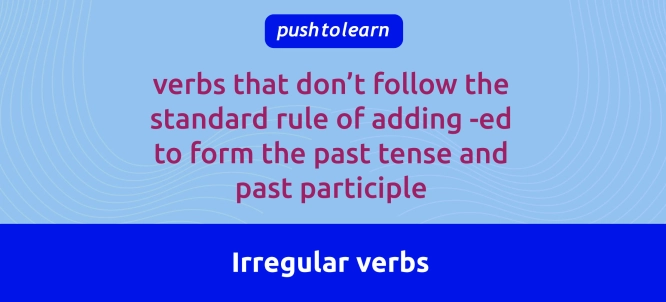by PushtoLearn
Verbos Irregulares en Ingles
Tabla de contenidos
Verbos Irregulares - Ejercicios
Estos ejercicios ponen a prueba diferentes formas de verbos irregulares.
Verbos Regulares vs. Irregulares
|
Tipo |
Ejemplo |
|
Verbo Regular |
Presente: walk → Pasado: walked → Participio Pasado: walked |
|
Verbo Irregular |
Presente: go → Pasado: went → Participio Pasado: gone |

Lista de Verbos Irregulares Comunes
Aquí tienes una tabla con algunos de los verbos irregulares más usados junto con sus formas en presente, pasado y participio pasado.
|
Forma Base (Presente) |
Pasado Simple |
Participio Pasado |
Ejemplo de Oración |
|
Arise |
Arose |
Arisen |
"She arose early in the morning." |
|
Awake |
Awoke |
Awoken |
"He has awoken feeling refreshed." |
|
Be |
Was/Were |
Been |
"I have been to London before." |
|
Bear |
Bore |
Borne/Born |
"She has borne the pain bravely." |
|
Beat |
Beat |
Beaten |
"They have beaten the other team." |
|
Become |
Became |
Become |
"He has become a famous artist." |
|
Begin |
Began |
Begun |
"The movie has just begun." |
|
Bend |
Bent |
Bent |
"He bent the wire into a circle." |
|
Bet |
Bet |
Bet |
"She bet all her money on the race." |
|
Bind |
Bound |
Bound |
"He bound the books with string." |
|
Bite |
Bit |
Bitten |
"The dog has bitten the mailman." |
|
Bleed |
Bled |
Bled |
"He bled after cutting his hand." |
|
Blow |
Blew |
Blown |
"The wind has blown the leaves away." |
|
Break |
Broke |
Broken |
"The vase was accidentally broken." |
|
Breed |
Bred |
Bred |
"The rabbits were bred for research." |
|
Bring |
Brought |
Brought |
"She has brought a cake to the party." |
|
Build |
Built |
Built |
"They built the house in just three months." |
|
Burn |
Burnt/Burned |
Burnt/Burned |
"He has burned all the old papers." |
|
Burst |
Burst |
Burst |
"The pipe burst in the cold weather." |
|
Buy |
Bought |
Bought |
"They bought a new car last month." |
|
Catch |
Caught |
Caught |
"She caught a cold after walking in the rain." |
|
Choose |
Chose |
Chosen |
"He has chosen the blue jacket." |
|
Come |
Came |
Come |
"She has already come home." |
|
Cost |
Cost |
Cost |
"The dress cost too much money." |
|
Cut |
Cut |
Cut |
"He cut the paper into small pieces." |
|
Deal |
Dealt |
Dealt |
"He dealt with the problem effectively." |
|
Dig |
Dug |
Dug |
"They dug a hole for the new tree." |
|
Do |
Did |
Done |
"I have done my homework." |
|
Draw |
Drew |
Drawn |
"She has drawn a beautiful picture." |
|
Dream |
Dreamed/Dreamt |
Dreamed/Dreamt |
"He dreamt about flying last night." |
|
Drink |
Drank |
Drunk |
"She has drunk all the juice." |
|
Drive |
Drove |
Driven |
"I have driven this route many times." |
|
Eat |
Ate |
Eaten |
"He has eaten the entire cake." |
|
Fall |
Fell |
Fallen |
"The apples have fallen from the tree." |
|
Feel |
Felt |
Felt |
"She felt cold in the winter air." |
|
Fight |
Fought |
Fought |
"They fought bravely in the battle." |
|
Find |
Found |
Found |
"I found my missing keys under the sofa." |
|
Fly |
Flew |
Flown |
"The bird has flown away." |
|
Forget |
Forgot |
Forgotten |
"I have forgotten her name again!" |
|
Forgive |
Forgave |
Forgiven |
"He has forgiven her mistakes." |
|
Freeze |
Froze |
Frozen |
"The lake has frozen over." |
|
Get |
Got |
Gotten/Got |
"I have gotten a new job." |
|
Give |
Gave |
Given |
"She has given him a gift." |
|
Go |
Went |
Gone |
"He has gone to the market." |
|
Grow |
Grew |
Grown |
"The plant has grown taller overnight." |
|
Hang |
Hung |
Hung |
"He hung the painting on the wall." |
|
Have |
Had |
Had |
"She has had a busy day." |
|
Hear |
Heard |
Heard |
"I heard a strange noise last night." |
|
Hide |
Hid |
Hidden |
"He has hidden the treasure well." |
|
Hold |
Held |
Held |
"She held her baby tightly." |
|
Keep |
Kept |
Kept |
"He has kept his promise." |
|
Know |
Knew |
Known |
"She has known him for years." |
|
Leave |
Left |
Left |
"They left early for the meeting." |
|
Lose |
Lost |
Lost |
"I lost my phone yesterday." |
|
Make |
Made |
Made |
"She made a cake for the party." |
|
Mean |
Meant |
Meant |
"I meant no harm." |
|
Meet |
Met |
Met |
"I met her at the conference." |
|
Pay |
Paid |
Paid |
"He paid for the meal." |
|
Ride |
Rode |
Ridden |
"She has ridden a horse before." |
|
Ring |
Rang |
Rung |
"The phone has rung twice already." |
|
Say |
Said |
Said |
"She said hello to everyone." |
|
See |
Saw |
Seen |
"I have seen that movie." |
|
Sell |
Sold |
Sold |
"He sold his car last week." |
|
Send |
Sent |
Sent |
"She sent the email yesterday." |
|
Speak |
Spoke |
Spoken |
"He has spoken to the manager." |
|
Take |
Took |
Taken |
"She has taken her lunch." |
|
Teach |
Taught |
Taught |
"He taught them how to swim." |
|
Tell |
Told |
Told |
"She told me a funny story." |
|
Think |
Thought |
Thought |
"I thought about you yesterday." |
|
Write |
Wrote |
Written |
"She has written a new book." |
Reglas para Aprender los Verbos Irregulares
No tienen reglas fijas
Los verbos irregulares deben memorizarse porque no siguen un patrón consistente.
Enfócate en los verbos más comunes
Comienza aprendiendo los verbos irregulares más usados, como be, go, come, do, say, have.
Agrúpalos por patrones
-
Verbos que no cambian: Cut – Cut – Cut
-
Verbos con el mismo pasado y participio pasado: Buy – Bought – Bought
-
Verbos que cambian completamente: Go – Went – Gone
FAQ sobre los Verbos Irregulares
¿Por qué algunos verbos son irregulares?
Son vestigios de formas más antiguas del inglés que no siguieron las reglas de regularización modernas.
¿Todos los verbos irregulares tienen formas diferentes en pasado y participio pasado?
No, algunos verbos irregulares tienen la misma forma en ambas (Buy – Bought – Bought), mientras que otros no cambian (Cut – Cut – Cut).
¿Cómo aprenderlos mejor?
Agrúpalos en patrones, usa tarjetas de memoria y practícalos en oraciones.

